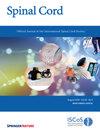中国大陆脊髓损伤患者的残疾轨迹:社会心理资源和疾病因素能否预测残疾轨迹?
IF 2.2
4区 医学
Q3 CLINICAL NEUROLOGY
引用次数: 0
摘要
研究设计观察性队列研究:确定从伤后1个月(急性期住院)到伤后6个月(在康复机构住院或重返社区的SCI患者)的残疾轨迹等级,并研究社会心理资源和疾病因素是否能预测残疾轨迹:环境:三家三级医院的脊柱外科。中国的医院分为三级(一级、二级和三级):方法:对所有受试者进行3次WHO残疾评估表(WHO-DAS 2.0),并在第一次评估表中记录受试者的个人资料、希望程度、创伤后应激障碍程度、社会支持程度。所有数据均由参与本研究的硕士研究生收集:利用潜类增长模型确定了两种残疾轨迹:连续高残疾组(196 人,占 93.3%)和低起点稳定组(14 人,占 6.7%)。完全损伤(ASIA-A)的 SCI 患者和 SCI 术后稳定状态下的抑郁症患者比残疾轨迹较低的患者更有可能被归类为残疾程度较高的患者。职业、家庭年收入、希望、社会支持和创伤后应激障碍(PTSD)无法预测属于不同轨迹等级的个体:这些发现强调了ASIA和抑郁症在SCI术后早期恢复阶段的重要性,并支持在SCI术后早期加强心理护理和康复管理将使残疾轨迹较低的个体受益的观点。本文章由计算机程序翻译,如有差异,请以英文原文为准。

Disability trajectories individuals with spinal cord injury in mainland China: do psychosocial resources and diseases factors predict trajectories?
Observational cohort study. To identify classes of disability trajectories from 1 month post-injury (acute hospital) to 6 months post-injury (individuals with SCI individuals who stay in rehabilitation setting or back in the community), and to investigate whether psychosocial resources and disease factors can predict disability trajectory. Spinal surgery in three Class III hospitals. Hospitals in China are divided into three classes (Class I, II and III). All the participants were submitted to WHO Disability Assessment Schedule (WHO-DAS 2.0) at three times; and personal data anamnesis, level of hope, level of PTSD, level of social support were recorded at first time. All the data collected by the master’s students who participated in this study. Two disability trajectories were identified using the latent class growth model: the continuous high disability group (N = 196, 93.3%) and the low starting point stabilization group (N = 14, 6.7%). Complete injury(ASIA-A) with SCI and more depression in the stable condition after SCI surgery were more likely to be classified as having higher disability than those with a lower disability trajectory. Occupation, annual family income, hope, social support, and Post-traumatic Stress Disorder (PTSD) cannot predict individuals belonging to trajectory classes. These findings emphasize the importance of ASIA and depression in the early recovery stage after SCI and support the opinion that strengthening psychological nursing and rehabilitation management at an early stage after SCI will benefit individuals with a lower disability trajectory.
求助全文
通过发布文献求助,成功后即可免费获取论文全文。
去求助
来源期刊

Spinal cord
医学-临床神经学
CiteScore
4.50
自引率
9.10%
发文量
142
审稿时长
2 months
期刊介绍:
Spinal Cord is a specialised, international journal that has been publishing spinal cord related manuscripts since 1963. It appears monthly, online and in print, and accepts contributions on spinal cord anatomy, physiology, management of injury and disease, and the quality of life and life circumstances of people with a spinal cord injury. Spinal Cord is multi-disciplinary and publishes contributions across the entire spectrum of research ranging from basic science to applied clinical research. It focuses on high quality original research, systematic reviews and narrative reviews.
Spinal Cord''s sister journal Spinal Cord Series and Cases: Clinical Management in Spinal Cord Disorders publishes high quality case reports, small case series, pilot and retrospective studies perspectives, Pulse survey articles, Point-couterpoint articles, correspondences and book reviews. It specialises in material that addresses all aspects of life for persons with spinal cord injuries or disorders. For more information, please see the aims and scope of Spinal Cord Series and Cases.
 求助内容:
求助内容: 应助结果提醒方式:
应助结果提醒方式:


